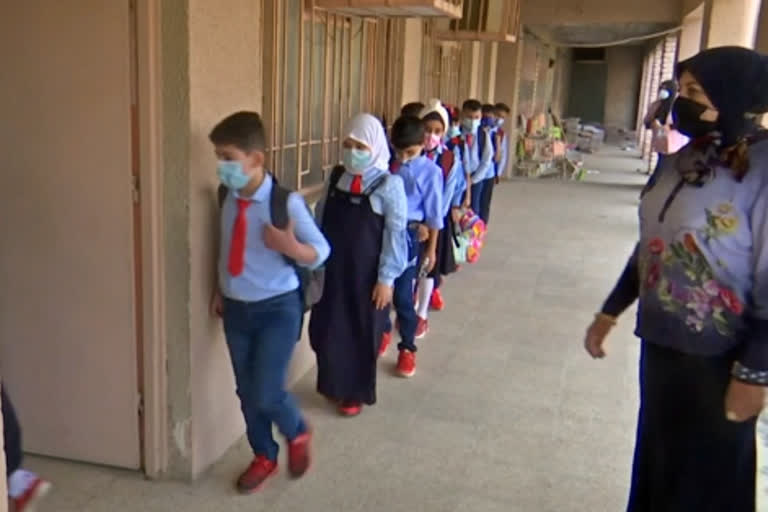Baghdad (Iraq): In Baghdad's primary Green Valley school, pupils wearing face masks waited in a long queue early Monday, passing through a disinfection tunnel before entering their classes.
The school's deputy school principal stood on the other side of the tunnel, disinfecting the children's hands with sanitizer.
Millions of Iraqi students returned to classrooms Monday for the first time in a year and a half – a stoppage caused by the coronavirus pandemic - amid overcrowding and confusion about COVID-19 safety measures.
The break with in-person schooling in Iraq is among the longest in the world, affecting some 11 million students nationwide.
Iraq's Ministry of Education provided learning in the interim through an online platform, but the focus has mostly been on students in higher grades sitting final exams.
According to the World Bank, learning levels in Iraq – a country ravaged by decades of conflict and government negligence - are among the lowest in the Middle East and North Africa and are likely to decline even further because of the impact the COVID-19 pandemic has had on education service delivery, including prolonged school closures.
Also read: EXPLAINER: Why do Iraq's elections matter to the world?
With schools closed over 75% of the time since February 2020 and opportunities for remote learning limited and unequal, Iraqi children are facing another reduction of learning‑adjusted years of schooling, it warned in a report last month.
"Effectively, students in Iraq are facing more than a 'lost year' of learning," the report added.
Online teaching in Iraq faced many challenges, including poor internet connection, power outages, and the economic situation of many families.
Haider Farouk Abdel Qader, a spokesman for Iraq's Ministry of Education, said Iraq's government took the decision to reopen schools after infection levels dropped due to the arrival of vaccines.
"It has become obligatory for everyone to resume their normal lives and part of this life is the educational and educational process," he told The Associated Press.
Iraq has registered 2,055,248 infection cases and 23,170 deaths so far during the pandemic.
But numbers of daily infections have slowed down, registering an average of 1,000 to 1,500 a day, down from a record average of over 12,000 in July.
The academic year starting Monday will include four days a week of physical attendance and a host of safety measures including obligatory vaccination or weekly PCR tests for teachers, mandatory face masks and sanitization and social distancing.
Also read: Drones target northern Iraqi airport after 2 month lull
But Iraq's public schools face chronic problems including underfunding and overcrowding, making them ill-equipped to properly enforce safety measures.
Abdel Qader said schools were given flexibility to adapt to the situation, like running the school on multiple shifts.
At the Wadi al-Akhdar, or Green Valley school in the impoverished and overcrowded Baghdad suburb of Sadr City, teachers welcomed students as they arrived at the gate Monday.
AP



